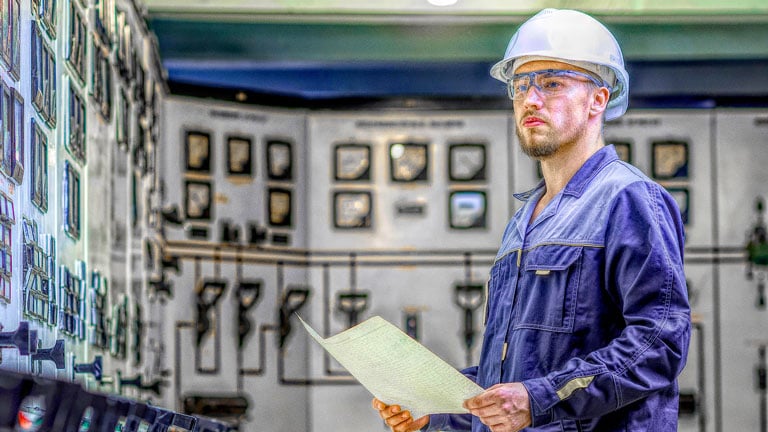The following tip is from the ISA book by Greg McMillan and Hunter Vegas titled 101 Tips for a Successful Automation Career, inspired by the ISA Mentor Program. This is Tip #56, and was written by Greg.
When I was the lead electrical and instrument (E&I) design engineer for what was then the world’s largest acrylonitrile plant, in my free time (when not going to concerts and bars in Harvard Square) I learned how to write a dynamic model of a compressor. Because one huge compressor was supplying the reaction air for the world’s largest catalytic reactors, I wanted to know more about surge control. I knew that reactor trips in other plants sometimes caused surge and the shutdown of other reactors. I got tables from the R&D group of the control valve manufacturer that enabled me to estimate the pre-stroke dead time and stroking time of large actuators for various positioners and boosters.
I got the surge curve from the compressor manufacturer, and momentum balance equations from the literature. I can’t say it was a great model, but it got the attention of Monsanto Engineering Technology process control group leader Vernon Trevathan. One of Vernon’s areas of expertise was compressor surge control. I got a job offer to be a specialist in a department of about 75 of the world’s best in process, materials, and mechanical technology and in process modeling and control. If I had not done that compressor model, I would have stayed a design engineer and generalist. My focus would have been specifying and buying instrumentation and configuring systems. At the risk of self-congratulation, I probably would not have become a Senior Fellow, would have not been inducted into the Process Automation Hall of Fame, and would have not gotten the ISA Life Achievement Award.

The point is that engineers have a difficult time getting recognition unless they can do something special. Today, you don’t need to write programs but you do need to know how to use programs and how to configure applications. In particular, I recommend learning how to do dynamic modeling. In the building of the model you will gain a deeper understanding of the process and of control problems and solutions. Running the model for different scenarios and control strategies will enable rapid exploration and quantification of process control improvements (see Tip #62, Tip #98, and Tip #99). New modeling packages with graphical configuration capability make the learning process as an extracurricular activity much more manageable. If you don’t have the skills and time, start with generic free online control loop simulators. If you build a virtual plant that successfully relates optimization benefits to golf, you may be invited to play golf with your CEO.
An emerging opportunity that is presently neglected is learning how to mine information from an asset management system (AMS) and an instrument management system (IMS). These systems are generally underutilized, perhaps because the expertise to get the most of out of these systems falls between groups. The smart instrument and positioner diagnostics and the AMS snap-ons for valve, vibration, ultrasonic, and failure analysis offer incredible capabilities for improving existing automation system performance.
There are many opportunities offered by advanced process control tools. Learning how to use an auto tuner and an adaptive tuner with loop metrics is an essential starting point of any career that seeks to go beyond E&I design and into loop performance.
Concept: Learn how to use dynamic modeling, system analysis, and advanced control tools in your free time. As you demonstrate improvements, management will provide the means for you to continue.
Details: Learn how to get the most out of an asset management system, an instrument maintenance system, and loop tuning and metrics tools. If you want to get more into designing process control strategies and improving the loop dynamics per Tip #70 and optimizing the setpoints of control systems, learn how to use dynamic modeling tools and build a virtual plant. To move beyond single loop optimization, learn how to apply model predictive control (MPC).
Watch-Outs: Most out-of-the-box dynamic models do not include transportation and mixing delays, measurement lags, transmitter damping, measurement noise, analyzer sampling and cycle time, wireless update rates and trigger levels, and control valve backlash and stiction. Consequently, the total loop dead time is dramatically lower than it would be in an actual plant. Because the maximum controller gain and minimum reset time are inversely and directly (respectively) proportional to the dead time, controller tuning conclusions are thereby invalidated. If valve pressure drops are not updated by the use of a pressure flow solver and tables of valve flow coefficients cannot be entered, the installed characteristic, and, thus, the process gain and resulting controller gain, will not include the effect of valve gain.
Exceptions: If you have children under the age of 10, you may not have time for personal development unless you can rent a grandparent as offered in the ISA book The Funnier Side of Retirement for Engineers and People of the Technical Persuasion.
Insight: Distinguishing yourself as having special skills requires initiative because companies are often not interested in personal development unless there is a clear impact on the bottom line.
Rule of Thumb: Use models to better understand the process and control system relationships and learn how to use tools for instrument system and loop performance analysis to improve the calibration and maintenance of instruments and the tuning of PID controllers.
About the Author
Gregory K. McMillan, CAP, is a retired Senior Fellow from Solutia/Monsanto where he worked in engineering technology on process control improvement. Greg was also an affiliate professor for Washington University in Saint Louis. Greg is an ISA Fellow and received the ISA Kermit Fischer Environmental Award for pH control in 1991, the Control magazine Engineer of the Year award for the process industry in 1994, was inducted into the Control magazine Process Automation Hall of Fame in 2001, was honored by InTech magazine in 2003 as one of the most influential innovators in automation, and received the ISA Life Achievement Award in 2010. Greg is the author of numerous books on process control, including Advances in Reactor Measurement and Control and Essentials of Modern Measurements and Final Elements in the Process Industry. Greg has been the monthly "Control Talk" columnist for Control magazine since 2002. Presently, Greg is a part time modeling and control consultant in Technology for Process Simulation for Emerson Automation Solutions specializing in the use of the virtual plant for exploring new opportunities. He spends most of his time writing, teaching and leading the ISA Mentor Program he founded in 2011.
Hunter Vegas, P.E., holds a B.S.E.E. degree from Tulane University and an M.B.A. from Wake Forest University. His job titles have included instrument engineer, production engineer, instrumentation group leader, principal automation engineer, and unit production manager. In 2001, he joined Avid Solutions, Inc., as an engineering manager and lead project engineer, where he works today. Hunter has executed nearly 2,000 instrumentation and control projects over his career, with budgets ranging from a few thousand to millions of dollars. He is proficient in field instrumentation sizing and selection, safety interlock design, electrical design, advanced control strategy, and numerous control system hardware and software platforms.




